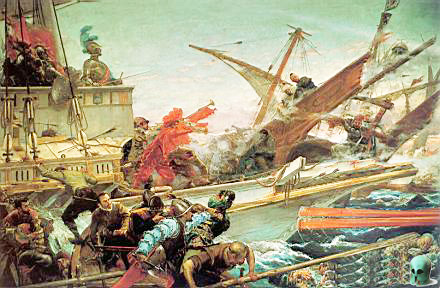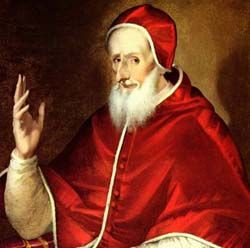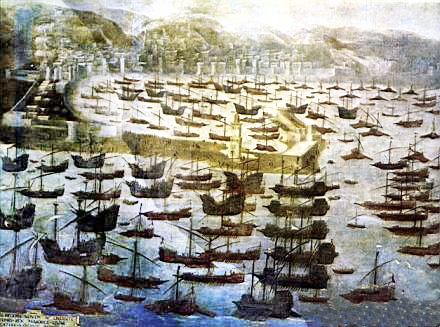
The Battle of Lepanto
By the 1560's, the Ottoman Empire had become a problem.

After being a centuries-old menace to European hegemony because of their Muslim beliefs and their thirst for expansion, the Turk military machinery was refined to worrisome levels. They tried taking Malta in 1565 with a siege and, while they ultimately lost, it showed how much of a threat they could pose to Christian nations. In 1566 they succeeded in conquering the Aegeean Islands (actually, they found no resistance).
The Empire's sultan died that year and was suceeded by a younger, more motivated one, Selim II. Of course, in Spain this was specially troubling. It particularly worried King Philip, who began to tighten his grip on his Muslim's territories (namely, the never-quite-conquered Granada) and this turned into a rebellion in which Ottoman troops were involved. Even though he eventually crushed the rebels, King Philip didn't feel victorious. The way was paved for the famous Battle of Lepanto
Something had to be done about the Ottomans.
Spanish Superman and the Holy League of Justice

The enemy was clearly too powerful. This required drastic measures - The pope St. Pius V was called. He created an alliance called the Holy League between basically every Christian territory (especially if it belonged to Spain) that had a coast to the Mediterranean. Habsburg, Naples, Venice, Savoy, Malta... They all contributed to a massive fleet of about 300 vessels, 50,000 soldiers and 4,500 horses.
And to run it, who better than warmonger extraordinaire Juan D'Austria? He was an illegitimate son of the previous Holy Emperor, Charles V. But he only realized this in his late teens, when prince Philip II tried to kill him. As the legend goes, when they both realized what was going on (Juan knew nothing of his royal heritage and Philip thought his brother would have royal expectations) melted in an embrace. Juan went on to receive the best Spanish tutors possible at the time.
He was a brilliant candidate. Juan turned out to be one of Spain's most educated military minds and became famous for his victories in Granada and in Tunisia.
Now, the epic confrontation between the world's two biggest empires was in his hands.
The Battle of Lepanto
The excuse for the battle to end all battles was created by a rogue Ottoman called Lala Kara Mustafa Pasha. He had masterminded a bloody siege in Cyprus, which back then was a Venetian territory. Mustafa Pasha promised the Venetians that if they surrendered they could leave the island unharmed.
He lied. As soon as his hostages tried to leave, he imprisoned them and killed their general. (In his defense, it must be noted that the Ottoman general had already lost 52,000 men on the siege, and that includes his own son.)

The Holy League needed no more prodding. They went straight to Cyprus. They ran into the Ottoman fleet much sooner than expected, but Juan D'Austria decided it was a good idea to attack anyway. What followed was an epic battle between two gigantic forces. The Turks mistook the galleasses (a recent Italian invention to carry artillery) for supply vessels and went for those.
This was a fatal mistake. The Holy League had ample room to retaliate fiercely. The strategy of the Spanish was intensive more than extensive. For five hours, all hell seemed to break loose. By 4 pm, the Turks surrendered. They had lost 210 vessels. The League only 20.
It was a crushing victory.
Aftermath
It was a shame, however, that the victors didn't know what to do with their victory. The Turks re-conquered Cyprus a few years later and Venice ceded it. They conquered Tunisia after Spain ceded it.
It would seem that, after all the stamina invested in the Battle of Lepanto, Europe was more vested in avoiding such expensive costs. To maintain the fleet, King Philip II calculated, would cost about two million ducats a year.
